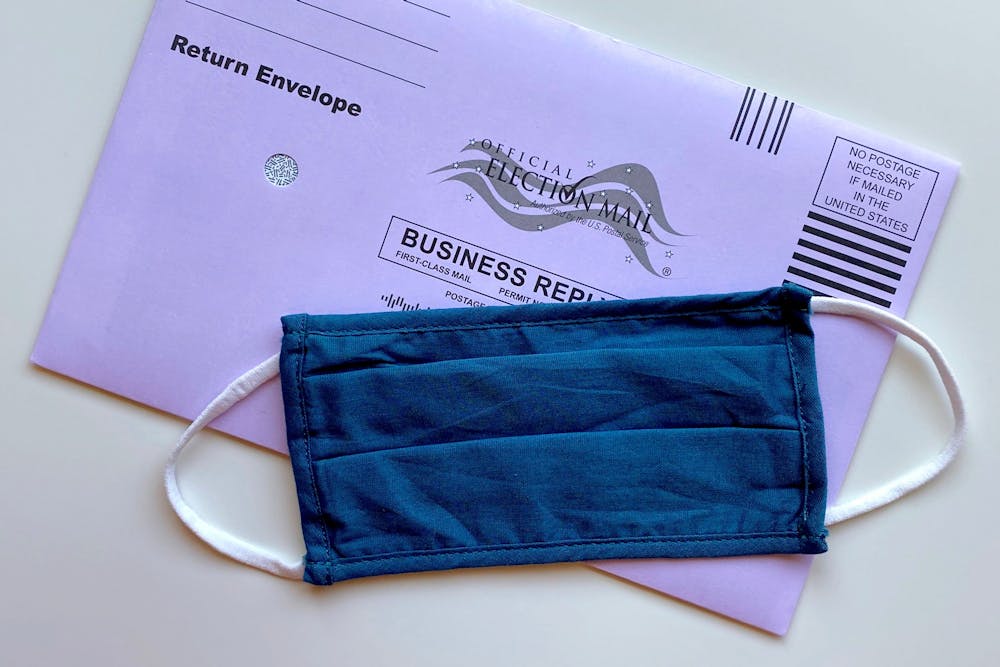As election day approaches, the call to participate in our democracy rings increasingly loud. Some UB students are anxious to answer that call, and they are eager to help their classmates do the same.
But connecting with a student body predominantly composed of students who live and work at home has challenged college campaigners who are used to engaging with eligible voters face-to-face.
In years past, student campaigners and get-out-the-vote initiatives like Student Engagement’s UB Votes have organized events to galvanize voters and boost historically low Election Day turnouts among college students.
This year, Millennials and Gen Z “will represent the largest age-group of eligible voters,” according to the Campus Vote Project. But with many UB students living and studying from home this semester, student campaigners and voting advocates fear Election Day turnout among student voters could be significantly lower than those of older age-based voter blocs.
Patrick Lynn, chairman of UB Bulls for Biden-Harris, says he worries about student voter turnout despite UB’s efforts to shuttle students to Sweet Home High School. He says galvanizing student voters during this election cycle has been challenging due to UB’s reduced on-campus population density and a noticeable decline in student engagement on- and off-campus.
“It has been difficult, obviously, because we can’t have big things on campus. It has to be virtual and that’s not [students’] first priority,” Lynn said. “No one wants to log into Zoom and talk to the party’s press secretary rather than meet them in-person. People are trying their best to campaign virtually, but people have their own lives going on. They’re all at work, they’re all at school.”
Student-run campaigns have faced challenges mobilizing the ‘student vote,’ as they rely heavily on tabling, canvassing and outreach tactics such as “dorm-storming” that are now forbidden by UB’s COVID regulations. In an effort to overcome these challenges, some student campaigners have begun transmitting campaign messages via social media and arranging phone calls and Zoom meetings with eligible student voters to various degrees of success.
Some students, who have become aware of their efforts, are now determined to vote.
With most classes being held virtually, students are staying at home. With a majority of classes being offered solely online, the number of students taking traditional in-person classes at UB decreased by 74% compared to the fall 2019 semester, according to UB’s COVID Tracker.
College campaigners are typically active in get-out-the vote efforts and, in years past, their hard work paid off. Voter turnout among college students was 48.3% in 2016, compared to 45.1% in 2012, according to the National Study of Learning, Voting and Engaging.
In 2016, organizations like UB Republicans and UB Democrats hosted presidential debate watch parties and helped students register to vote. Students from other organizations promoted voting by tabling in the Student Union and visiting classrooms of eligible voters as part of a UB Votes initiative. UB Students for Trump, which was active four years ago, installed campaign signs and drew messages on sidewalks near the academic spine in the days leading up to the 2016 election.
This year, there are less on-campus events urging students to vote, but that doesn’t mean student campaigns have given up trying to court eligible voters.
Bulls for Biden-Harris’ approximately 15 members have participated in virtual phone banks and established social media profiles on Instagram and Facebook to spread their campaign’s core values to potential voters.
But Lynn says enthusiasm still remains stubbornly low. He wonders if the lack of excitement also stems from candidates not “speaking” to young voters.
“I think the fact that Joe Biden’s the guy on the ticket doesn’t really speak to many young people. That’s something we’re trying to work on,” Lynn said.
Derryck Hains, the president of UB Democrats, attributes some of the lack of enthusiasm to the fact that students’ electoral importance lies primarily in local contests.
“There are lots of local races that are very close in New York State and students can make a difference in a lot of those,” Hains said.
New York, which is solidly Democratic, is not anticipated to be a competitive state in this election cycle.
Activity from Republican activists on campus appears even scarcer, according to UB College Republicans President Dominic Musilli. Musilli said he is “not aware” of any on-campus activity from the Trump camp. Students for Trump has an Instagram page, but its last post was on Feb. 5, over a month before the peak of the COVID pandemic and the nomination of the Democratic nominee Joe Biden.
Despite the lack of on-campus activity, UB students and voter advocates have inspired at least some young voters to cast their ballots.
Ian Unson, a senior industrial engineering major, says he now feels there is an “urgency” for students to vote this year, especially given that the effect of several key election issues could hugely impact student voters’ lives.
“There are many issues that affect students this election,” Unson said. "Student debt, healthcare and income equality are among the most important. That’s what’s causing this urgency to vote.”
Therese Purcell, a junior history major and president of the UB chapter of Young Americans for Freedom, says she and some of her friends from YAF intend to vote in the upcoming election. She says the right to vote for politicians who represent one’s values is a freedom Americans are “blessed” to have.
"As President of Young Americans for Freedom at UB, I have been pleased to see students aware of the current political issues facing our country,” Purcell said. “We are incredibly blessed to live in America, and we value our freedoms...making it important to go out and vote for politicians who will enact policies that represent our values.”
The news desk can be reached at news@ubspectrum.com





